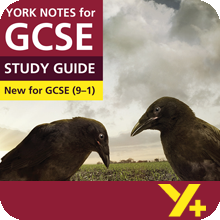Your Assessment
Read through the answer below and decide what grade to give it. Use the Hints & Tips to help you make your assessment.
How does Orwell use characters and events in Animal Farm to explore ideas about corruption?
Write about:
- what characters say and do
- how Orwell uses these characters and events to present ideas about corruption.
Orwell wrote 'Animal Farm' as a warning against dictatorships, so corruption is a very important theme in the novel, as this is Orwell’s main method to show us how the animals’ Republic is destroyed. The novel is an allegory of the Russian Revolution, so Orwell wrote it to make a specific political point to his readers about why things went wrong in Russia and to prevent it happening again.
Orwell uses several techniques to show us how corruption comes about on 'Animal Farm'. Firstly, we are told that the first ruler of Animal Farm, Mr Jones, is incompetent and cruel. Orwell writes that he is ‘too drunk to remember to shut the pop-holes’ and neglects the animals, making us see him as an unfit, corrupt leader.
Old Major’s speech, which contrasts life under corrupt Mr Jones on Manor Farm where the animals are ‘slaughtered with hideous cruelty’ with a world where they could live in ‘comfort and dignity’ offers a dream of a better life. Major calls the other animals ‘friends’ and ‘comrades’ because Orwell wants to show us that the animals would be equal in Major’s society.
After the animals drive Jones out from the Farm, we get a glimpse of this dream in action – the harvest is done two days’ quicker than under Jones and not ‘so much as a mouthful’ is stolen, showing the animals working in democratic harmony, as Major predicted (even if the animals depend on the pigs to organise them). Orwell wants us to see democracy as the ideal form of government and emphasises how happy the animals are at this time to drive this point home.
The first sign that this will not last is when the animals come back from the harvest and realise that the milk and apples have gone. Orwell’s use of the passive voice ‘it was noticed’ shows us that the animals don’t realise what has happened, even though they last saw Napoleon stand in front of the buckets. But the reader does: the pigs have taken these luxuries for their own use. Orwell said this was a turning point in the novel, as the animals could have stopped the pigs but didn’t. This suggests that corruption only starts because there is little opposition to it: as the animals don’t understand what is happening the pigs can take advantage of their trust and ignorance. This is also clear when the animals learn to read and write: the pigs find it easy but most of the other animals find it difficult, creating problems later on. We see that the pigs find the other animals easy to exploit.
Orwell uses the structure of the Seven Commandments to show us how the Farm descends from its ideal state into tyranny. The Commandments, like the Ten Commandments in the Bible, are meant to be a set of laws for the animals all to live by. But, because they are cleverer than the other animals, the pigs begin to manipulate the Commandments for their own benefit. So Orwell shows us that if leaders are much cleverer than the public, they can take advantage of them and benefit from their superiority, if no-one is clever or brave enough to stop them.
The animals completely believe that those executed for being in league with Snowball were traitors (because Napoleon and Squealer tell them so), even though as readers we know they were only killed because they challenged Napoleon. Orwell’s list of reasons for the executions become more ridiculous until two sheep are executed for chasing an old ram to his death ‘around a bonfire when he was suffering from a cough’.
The animal’s complete trust in the pigs and their own lack of education means that the pigs’ authority is never really questioned. Faced with such blind obedience, Orwell shows us how easily democracy can slide into totalitarianism and how quickly this can happen.
